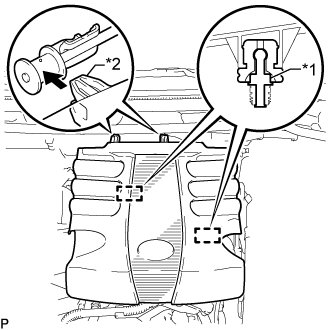Land Cruiser URJ200 URJ202 GRJ200 VDJ200 - 1GR-FE COOLING
THERMOSTAT - INSTALLATION
| 1. INSTALL WATER INLET WITH THERMOSTAT |
Install a new gasket and the water inlet with thermostat with the 3 nuts.
- Torque:
- 9.0 N*m{ 92 kgf*cm, 80 in.*lbf}
| 2. CONNECT NO. 2 RADIATOR HOSE |
Connect the No. 2 radiator hose.
| 3. INSTALL V-BANK COVER |

Attach the 2 V-bank cover hooks to the bracket. Then align the 2 V-bank cover grommets with the 2 pins and press down on the V-bank cover to attach the pins.
| *1 | Pin |
| *2 | Hook |
| 4. ADD ENGINE COOLANT |
Add engine coolant.
- Standard Capacity (for Manual transmission):
Item Specified Condition w/ Rear Heater 14.6 liters (15.4 US qts, 12.8 Imp. qts) w/o Rear Heater 11.7 liters (12.4 US qts, 10.3 Imp. qts)
- Standard capacity (for Automatic transmission):
- 11.2 liters (11.8 US qts, 9.9 Imp. qts)
- Standard Capacity (for China):
- 14.4 liters (15.2 US qts, 12.7 Imp. qts)
- NOTICE:
- Do not substitute plain water for engine coolant.
- HINT:
- TOYOTA vehicles are filled with TOYOTA SLLC at the factory. In order to avoid damage to the engine cooling system and other technical problems, only use TOYOTA SLLC or similar high quality ethylene glycol based non-silicate, non-amine, non-nitrite, non-borate coolant with long-life hybrid organic acid technology (coolant with long-life hybrid organic acid technology consists of a combination of low phosphates and organic acids).
Slowly pour coolant into the radiator reservoir until it reaches the F line.
Install the reservoir cap.
Press the No. 1 and No. 2 radiator hoses several times by hand, and then check the coolant level. If the coolant level is low, add coolant.
Install the radiator cap.
Set the air conditioning as follows while warming up the engine.
| Item | Condition |
| Fan speed | Any setting except off |
| Temperature | Toward WARM |
| Air conditioning switch | Off |
Start the engine and warm it up until the thermostat opens.
- HINT:
- The thermostat opening timing can be confirmed by pressing the No. 2 radiator hose by hand, and checking when the engine coolant starts to flow inside the hose.
Maintain the engine speed at 2000 to 2500 rpm.
- NOTICE:
Press the No. 1 and No. 2 radiator hoses several times by hand to bleed air.
- CAUTION:
Stop the engine, and wait until the engine coolant cools down to ambient temperature.
- CAUTION:
- Do not remove the radiator cap while the engine and radiator are still hot. Pressurized, hot engine coolant and steam may be released and cause serious burns.
Check that the coolant level is between the F and L lines.
If the coolant level is below the L line, repeat all of the procedures above.
If the coolant level is above the F line, drain coolant so that the coolant level is between the F and L lines.
| 5. INSPECT FOR COOLANT LEAK |
- CAUTION:
- To avoid being burned, do not remove the radiator reservoir cap while the engine and radiator are still hot. Thermal expansion may cause hot engine coolant and steam to blow out from the radiator.
Fill the radiator with engine coolant, and then attach a radiator cap tester.
Warm up the engine.
Using the radiator cap tester, increase the pressure inside the radiator to 123 kPa (1.3 kgf/cm2, 18 psi), and then check that the pressure does not drop.
If the pressure drops, check the hoses, radiator and engine water pump for leakage. If there are no signs or traces of external engine coolant leakage, check the heater core, cylinder block and head.
| 6. INSTALL NO. 1 ENGINE UNDER COVER SUB-ASSEMBLY |
Install the No. 1 engine under cover with the 10 bolts.
- Torque:
- 29 N*m{ 296 kgf*cm, 21 ft.*lbf}
| 7. INSTALL FRONT FENDER SPLASH SHIELD SUB-ASSEMBLY LH |
Push in the clip to install the front fender splash shield sub-assembly LH.
Install the 3 bolts and screw.
| 8. INSTALL FRONT FENDER SPLASH SHIELD SUB-ASSEMBLY RH |
Push in the clip to install the front fender splash shield sub-assembly RH.
Install the 3 bolts and 2 screws.